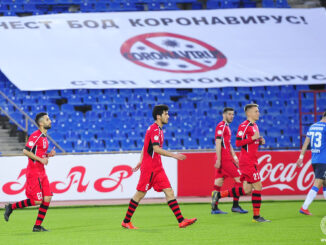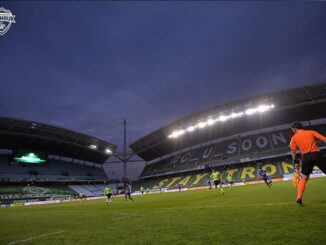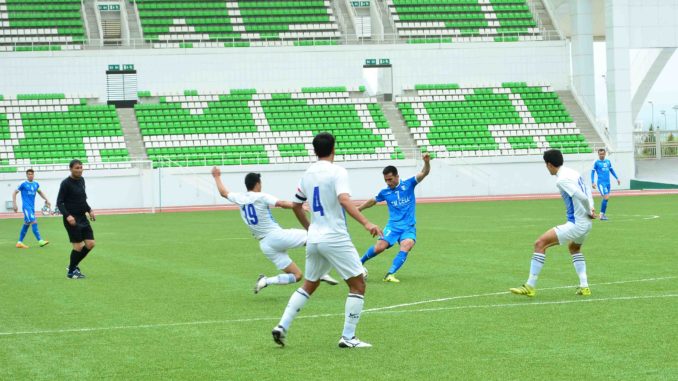
This Sunday, the Turkmen Yokary Liga will resume as the fifth active domestic league in world football, the third in Asia, but interestingly the first to have returned to play following a Coronavirus suspension, which only came into force less than a month ago.
When football concluded on 23 March after three matchdays, for what was intended to be the FIFA international break, the Football Federation of Turkmenistan (TFF) fell into line with the rest of the world in suspending football indefinitely due to the ongoing outbreak.
Three weeks on, with remarkably no cases of COVID-19 found, Gurbanguly Berdimuhamedov’s presidential decree banning Turkmenistan’s citizens, including any medical professionals, from even talking about the virus has inevitably signalled domestic football’s return.
There’s no disputing, however, that the success of neighbouring Tajikistan and their domestic Higher League over the last few weeks has contributed to this speedy reversion.
Capitalising on a dire marketplace starved of meaningful football has brought with it attention and moderate investment to a Central Asian region in great need, a cake of which Turkmenistan will undoubtedly want a slice.
Turkmenistan were one of the first countries to be hit by the outbreak – way back in early February, forced to reschedule their hosting of this year’s AFC Futsal Championships (a sport that realistically challenges football as the nation’s favourite sport).
A resumption in domestic competition is then a clear statement of stability, a sign that a postponed tournament (pencilled in initially for the beginning of August) could realistically be staged this year, all in front of unprohibited attendances, with stadiums expected to be open as normal.
This “opportunity” also gifts a chance for Turkmen football to project itself past its regional boundaries and look to grow, as others around them have.
Up until very recently football has been increasingly inward looking, at times self serving. It’s been known for clubs to block transfers abroad, and to ignore those who were able to when considering national team call ups. The Yokary Liga has noticeably become stagnant, a symbolic footballing backwater, that only recently started to consider signing players from abroad.
It’s recent history has been entirely inconsistent and glaringly disparate. The top teams have significant financial backing, while the trickle down barely covers the cracks.
The league has slowly shrunk, from a consistent ten teams with promotion and relegation a few years back to an increasingly threadbare eight, with little to no demand for promotion or expansion. The league isn’t getting refreshed with new blood, all the while beginning to slowly recede.
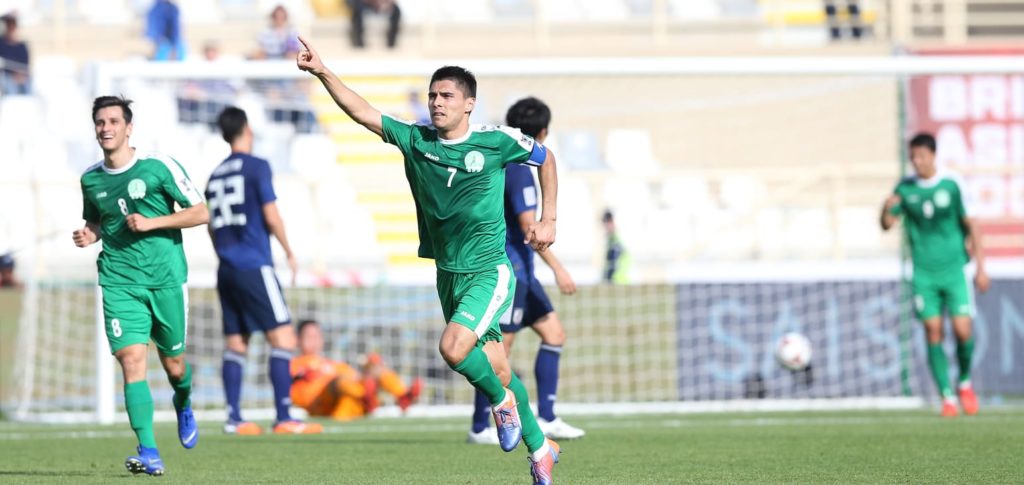
(Photo: the-AFC.com)
Turkmenistan’s surprise, and some may say fortunate, qualification for the Asian Cup in 2019 came as a clear turning point in the sport’s trajectory, however. While they didn’t come away from the UAE with anything to show for their efforts, spirited performances, especially in their group stage opener against Japan, ignited a spark in football interest and development back home.
A partnership with the Croatian Football Federation was immediately established thereafter, which enabled a top to bottom reshuffle, establishing the country’s first organised youth championship, a reinforced and supported Birinji Liga (the Turkmen second tier), whilst seeking to improve the Yokary Liga’s competitive edge.
National team coach Ante Mise, who regrettably was relieved of his duties due to the Coronavirus outbreak (who is assumed to return once competition resumes) sought to develop an open minded, wider net approach to selection that encompassed Turkmen expats playing in far flung overseas championships and crucially those once overlooked at unfashionable domestic club sides.
It’s a policy aimed to divert attention from one single club, a side that has grown to become synonymous with Turkmen football as a whole. Altyn Asyr, the domestic champions six times running, backed by the national telecommunications company by the same name, have changed the sporting landscape dramatically since their formation a mere 12 years ago..
With resources funnelled into the club; from cash investment to the country’s very best footballing talent, Altyn Asyr have duly prospered at home and abroad, but left a league on its knees trailing in its wake. Last year’s shakeup in turn has sought to level the playing field.
Led by legendary head coach Yazguly Hojageldyyev, Altyn Asyr’s successes were as much a strain as they were a benefit for the country’s football. His dominance and presidency amidst the footballing elite, which included nine titles with two different clubs over an expansive career is untouchable, alongside successes at national team level including recent qualification to the Asian Cup, and AFC Challenge Cup final appearances.
2018 was his most pivotal year, as Altyn Asyr made the AFC Cup final where they lost to Al-Quwa Al-Jawiya of Iraq, ahead of his national team role in helping preparations for the Asian Cup.
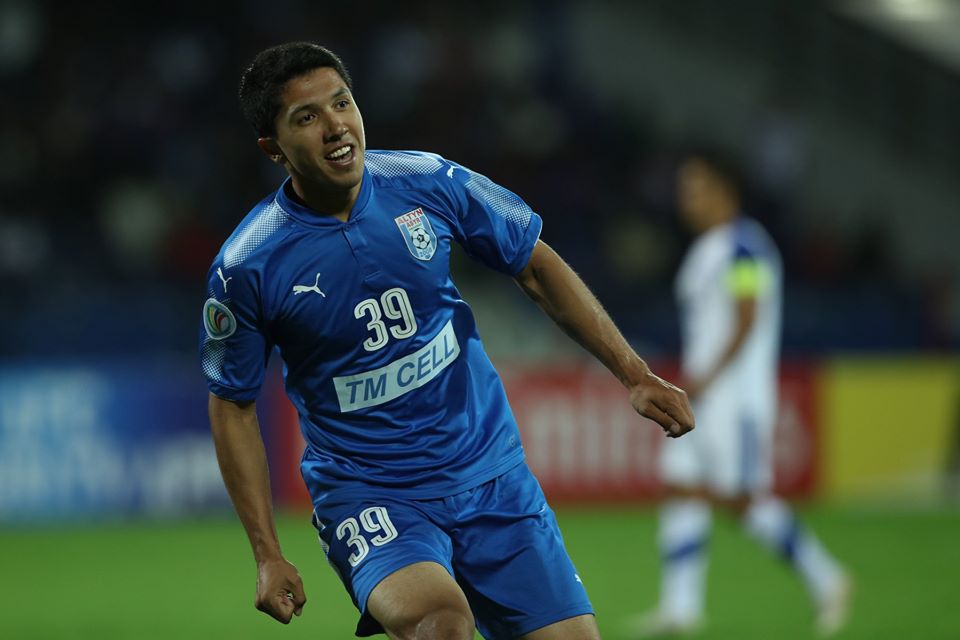
(Photo: Facebook/AFC Cup)
Instead of juggling two squads, Hojageldyyev simplified things and focused primarily on his domestic employers, basing the national team setup around the club skeleton, using the club’s long run in AFC competition as the national team‘s warm up.
His preference for Altyn Asyr playing staff attracted the very best domestic based talent his way, all after a chance to feature at an Asian Cup, but often this meant discarding those who didn’t agree with his fixed and disciplined ideologies.
The national team were flying high, but it’s inflexibility left it vulnerable, and it showed. The side that travelled to the Emirates lacked a Plan B from sitting ten men behind the ball, and the required options in reserve to switch the game up.
Post Asian Cup, with Hojageldyyev adjusting back to a purely domestic capacity, talent has started to freely move around the league again with the national team door now wide open.
Altyn Asyr’s closest challengers, FC Ahal, look to have made the most of this with the best acquisitions of the winter transfer window, bringing in national team striker Murat Yakshiyev from their city rivals, and copping the return of legendary nomad Artur Gevorkyan.
Gevorkyan returns to Turkmenistan with a wealth of experience to offer, after a playing career that took in much of Asia and Eastern Europe since he left his homeland in 2006.
His importance with the national team was integral over that period, up until a clash of personalities with then coach Hojageldyyev cost him a spot at the Asian Cup.
His return to the Yokary Liga, at the club most likely to challenge Hojageldyyev’s Altyn Asyr for silverware this season, adds yet more spice to the Asgabat Derby and domestic title race.
Ahal represent Turkmenistan’s nearly men, having finished second in four out of the last six seasons. Each year they have threatened to the last, cutting the gap on the league leaders season-on-season while continually competing well in head-to-head clashes.
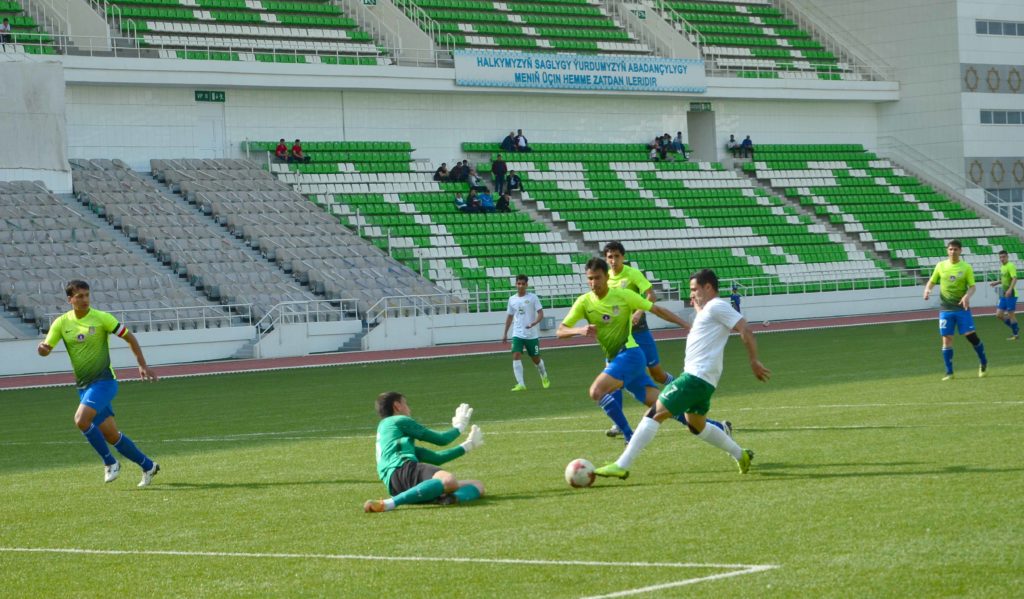
(Photo: TFF)
With a promising off-season under their belts, and a stronger youth cohort willing to stay and prosper with the club, they’ll push the champions close again this term.
As will Sagadam, the provincial outfit and only realistic challenger from outside the nation’s capital. Based in Turkmenbasy on the shores of the Caspian Sea, Sagadam have regularly proven to be a thorn in the champions’ side, edging close to a AFC Cup qualification spot last term and already holding them to a point this.
A dissimilar threat comes in the force of former national powerhouse Kopetdag. Arguably the biggest, and most supported side in the country, the capital club have struggled to keep pace with the top places of late, having last tasted domestic glory at the turn of the century. Having started well this term, however, could they be the true beneficiary of a redressed playing field?
Talking up the opposition is one thing, but Altyn Asyr remain favourites to win their seventh title on the bounce, which would take them one clear of Kopetdag in the all time record books.
Having always looked to move forward the nation’s image, in addition to their own, news that an AFC Champions League group stage spot will be granted to this year’s Yokary Liga champions, won’t have escaped those in sky blue, of yet another opportunity to make regional history.
Boasting a squad full of experience, with some interesting options in attack, they remain a step ahead in most areas of the pitch, but with a tendency to retreat in tight contests rather than blowing teams away, will the narrowing of the field affect them come the final furlongs?
While the world looks to restrict movement, to close down public events and isolate from one another, Turkmenistan stands firm in its stance to fight a global pandemic with indifference and ignorance.
Last weekend’s large scale public festivals underlined the President’s plans to move forward oblivious of the lingering threat, and football isn’t excluded from that.
While the name of flying winger Altymyrat Annadurdyyev might seem unfamiliar now, give it a few weeks and the former Futsal-star-turned-national-football-hero will be the first on many an Asian football fan’s lips.
Main Photo: Football Federation of Turkmenistan


